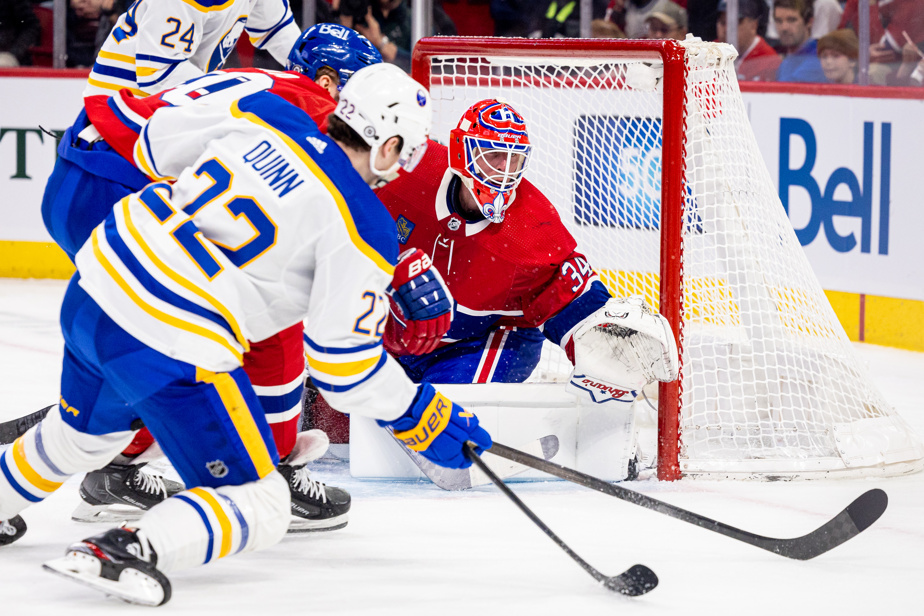When the Canadian’s numerical advantage is down, we systematically hear the good joke that, like in American football, it should be allowed to decline a penalty. We then burst into deep laughter, watch two long minutes of sterile play and then repeat the same joke at the next opportunity.
Is there an equivalent quip for an anemic penalty kill? Let’s say when a unit gives in three times out of ten, sometimes more during certain particularly difficult sequences?
If a fine witticism came to mind, we would have ample opportunity to rehearse it by watching the Flannel, who again gave up twice short of a man against the Buffalo Sabers, Thursday evening, in a embarrassing 6-1 loss.
A little less than a month ago, La Presse looked at the CH’s dismal numerical disadvantage. “It doesn’t work,” Johnathan Kovacevic coldly analyzed, who explained his team’s difficulties in effectively applying the “diamond” scheme, although it is very widespread in the league.
The defender said: “The trend started six or seven games ago. [Our opponents] started to expose us with plays at the bottom of the zone, where we gave them too much space. »
The Canadian has now played 13 since Kovacevic’s remark. Adding the “six or seven” that he had mentioned, it would therefore be around twenty games that the gap has been known. This same gap that the Sabers exploited twice in less than two minutes. On their first net, Jeff Skinner had something like 127 hours to plan his crosscourt pass to Casey Mittelstadt. On their second, the exchange between Alex Tuch and Skinner was quicker, but the scenario was the same: the two Sabers forwards had all the space they wanted to work at ease near the net defended by poor Jake Allen .
After the meeting, Martin St-Louis was decidedly not talkative – his entire press briefing, in French and English, lasted three and a half minutes.
He attributed these two shorthanded goals to “individual errors.”
The answer would be satisfactory if it were an accident. However, we find several variations in the club’s latest matches.
At Sunrise last Saturday, Eetu Luostarinen took advantage of a good three seconds in possession of the puck to advance to the net and score.
Against the Sabres, it was the fourth time in ten games that the opponent won twice on the power play.
Here is now the Canadian in 31st place in the league in shorthanded play, thanks to a pathetic performance of 72.1%. A success rate (the word is strong) similar to that of the last season.
“We are chasing consistency,” said Martin St-Louis. There are matches where we are very good. This evening, we weren’t there. »
In the eyes of Jordan Harris, the problem lies mainly in communication. He, too, has noticed “problems” when the other team “sends two guys to the goal line.” “We work on that in training,” he assured. We pay attention to all the details. »
More generally, Sean Monahan acknowledged that his club needs to “be better at keeping the puck out of the goal.” “We have to find ways to place our sticks to block access” to the net, he said.
David Savard, one of the players most in demand in these circumstances, also pointed out the “individual errors which snowball”. “We’re going to look at what we’re doing wrong and we’re going to continue to learn,” he added. He also definitely didn’t want to improvise a TED talk on the issue.
Martin St-Louis admitted, in an interview with Sportsnet before the start of the season, that he had neglected the power play last year. He hadn’t made it a priority, he said, because the team was “not ready to win.”
Since the start of this campaign, the power play has received some love. And things are a little better, despite the absences of Kirby Dach and Alex Newhook, two obvious contributions in this phase of play.
In the long list of injured CH, only Rafaël Harvey-Pinard appears as a four-on-five specialist. We could now add Christian Dvorak. So it’s hard to blame the infirmary.
Perhaps the fundamental problem lies with the existing staff and their ability to adapt? Perhaps it is also in its preparation and supervision? Maybe it’s a bit of all that.
Either way, the problem is real. And screaming. And it costs matches.
This is not a joke. He kept his teammates in the game for two periods, and they left him in the third. Despite the high score, we honestly cannot blame him for the defeat.
When you are the extra defender, you are already skating on thin ice. So when you also experience a difficult exit, the room for maneuver is also very slim. No presence in the third period.
That’s how much time remained on the clock when Martin St-Louis recalled his goalkeeper to the bench in the hope that his club would reduce the deficit to 4-1. Before you blinked, it was 5-1. The Dallas Stars don’t want him.
